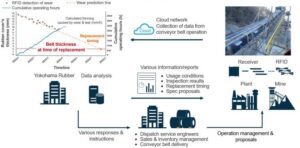Yokohama Rubber conveyor belt sensing technology detects abnormalities in real time
Hiratsuka, Japan—The Yokohama Rubber Co., Ltd., has developed a sensing technology that remotely monitors the operation of conveyor belts and detects abnormalities in real time. The company plans to launch a comprehensive solutions service using the data captured by the proprietary sensing technology. This will allow operators to optimize the management of conveyor belt operations. Yokohama Rubber aims to begin this service by the end of 2027.
Extensive field trials held between February 2022 and December 2024 have successfully confirmed the technology’s capabilities. The new system integrates a proprietary RFID tag with Yokohama Rubber conveyor belts, enabling detection of minute changes in the belt’s wear, damage, temperature and other conditions that cannot be detected by normal inspections. The detected data are transmitted directly to Yokohama’s data center where they are monitored in real time. The comprehensive solutions service being developed by Yokohama Rubber will allow users to consult the data, enabling the early identification of abnormalities that will contribute to the prevention of damage and fire risks. The added value to users is that a staff of specialists at Yokohama Rubber will analyze the data transmitted by the sensing technology and propose measures to enhance management of the user’s conveyor belt systems. Yokohama Rubber has applied for 13 patents related to this sensing technology and its operating system, and the company will continue to accumulate intellectual property.
*RFID (Radio Frequency Identification) refers to a wireless automated recognition technology capable of reading and writing data using radio waves.
The planned comprehensive solutions service using Yokohama Rubber’s sensing technology will enable the early detection of potential risks that helps prevent accidents and improves conveyor belt safety. The service also will improve the economic efficiency of conveyor belt operations and reduce maintenance costs by enabling users to reduce physical conveyor belt inspections and maintenance labor, thereby alleviating labor shortages that are currently a major issue at sites using conveyor belts. In addition, Yokohama Rubber’s staff of specialists monitoring conveyor belt operations will recommend appropriate proposals for inspection frequency, replacement cycles, and optimal product specifications that meet the individual usage environments and requirements of the system’s users. Yokohama Rubber expects the use of its comprehensive solutions service will enable users to realize optimal management of their conveyor belt operations and extend the product’s useful lifespan, contributing to Yokohama Rubber’s efforts to reduce the environmental impact of its conveyor belt manufacturing operations by reducing CO2 emissions and raw materials used.
In Yokohama Transformation 2026 (YX2026), the company’s medium-term management plan for fiscal years 2024–2026, Yokohama Rubber aims to solidify its leading share in Japan’s conveyor belt market, one of the core products in the MB Segment’s industrial products business. This effort will include creating new added value that contributes to the safety, security, and economic efficiency of users of Yokohama Rubber’s conveyor belts.

